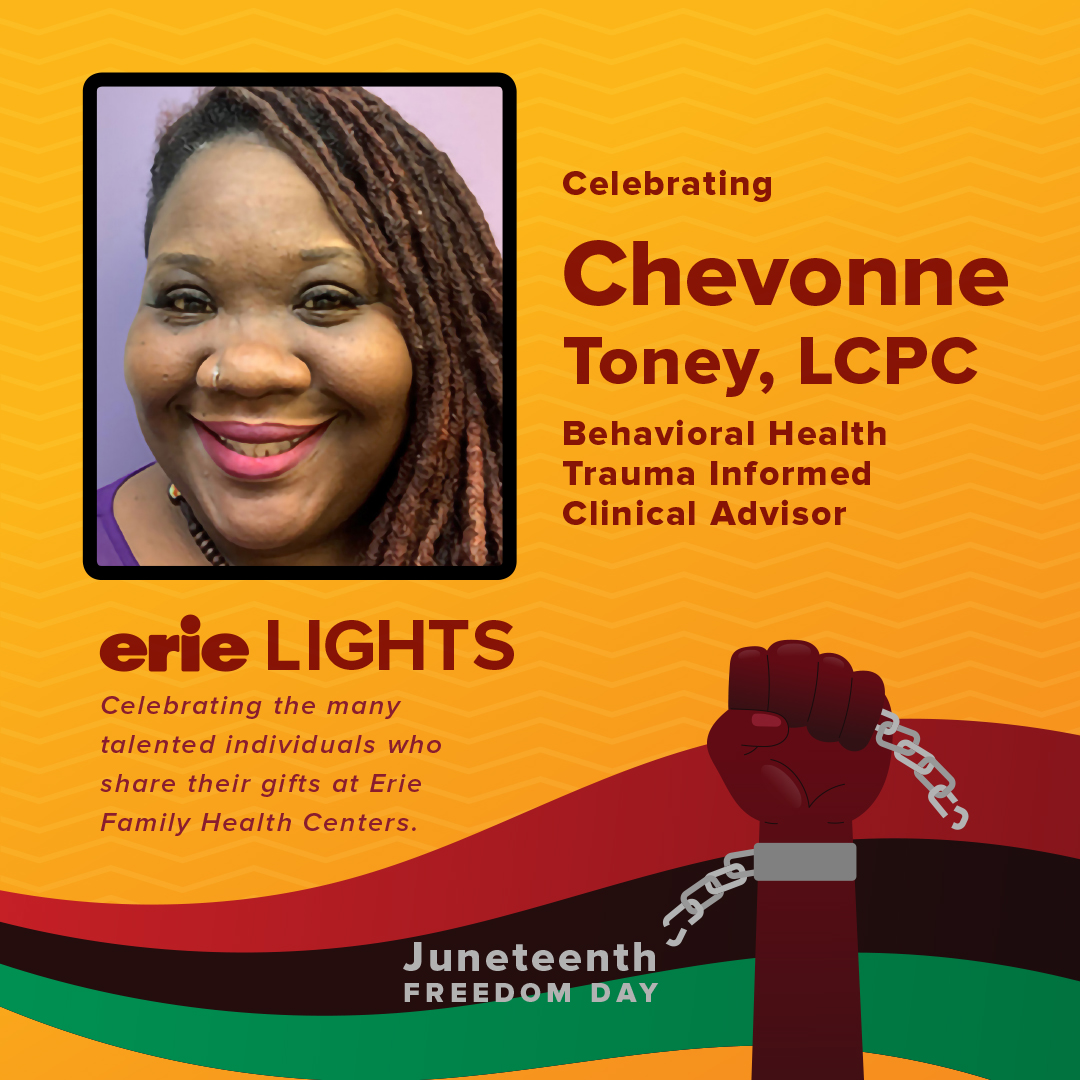
Chevonne Toney has naturally connected and comforted people around her for over two decades. As a Behavioral Health Trauma Informed Clinical Advisor, Chevonne continues to use her talents to assist Erie in providing essential care and understanding to the students and families at the Erie Johnson School-Based Health Center.
Initially, I wanted to become a lawyer, but then I set my sights on becoming Chicago's first African American female mayor. When I attended Jackson State University, my focus was Political Science but shifted to Criminal Justice when I realized my dislike for political science. During a conversation with my counselor, she mentioned the different concentrations under Criminal Justice, Correctional Counseling grabbed my interest. As I started taking classes and building relationships, I discovered that people often confided in me and found comfort in sharing their problems with me. It just clicked, and I realized that the career had found me as much as I had found it.
What brought you to Erie?
It was all thanks to a woman named Sandy Small. At the time, I was working at Mount Sinai Hospital, specifically in a community mental health center called Mile Square, where I was involved in SASS work—screening, assessment, and supportive services which is on call crisis intervention, where I worked the medical district and the near westside. Sandy, who worked at what is now known as Laura Ward (formally Ryerson school), reached out to me for SASS assistance for a student. We instantly connected, and she began referring more clients to me. Even after I transitioned to private practice from Mount Sinai/Mile Square, Sandy continued to reach out to me, eventually leading me to join Erie’s site at Johnson Elementary School. Ever since then, Johnson has felt like home to me.
Can you walk us through a day in the life of a Behavioral Health Trauma Informed Clinical Advisor?
My typical workday involves delivering telehealth services to clients. Being part of Johnson, a smaller site, allows me to collaborate with medical providers closely. When I encounter patients interested in medication, I can easily involve a medical provider to provide them with additional information. At the end of the day, I join medical providers to discuss the students and patients we've seen (Huddle) to discuss next steps or follow up needed. In the school environment, I meet with the care team and specific cases are recommended for me to handle.
As part of our trauma-informed approach, we strive to cultivate a culture of empathy and support within the agency, extending to our interactions with each other as colleagues and to the care we provide to our patients.
What would you say is the most rewarding aspect of your job?
One of the events that stands out is a conversation with a gentleman who was struggling deeply with his life. He believed he was a terrible human being, recounting his troubled childhood and labeling himself horrible. I encouraged him to share more about his upbringing and experiences, highlighting the presence of domestic violence, physical abuse, emotional abuse, and periods of homelessness. I asked if he believed any of those circumstances could have impacted his mental well-being, perception of the world, and his own behaviors. He had an "Ah ha" moment, realizing the connections between his past and his present struggles. His perspective shifted, acknowledging that his actions were influenced by the aggression and various forms of trauma he witnessed and the challenges he faced. I further questioned if he believed he would have encountered the same issues and obstacles if he had been raised in a “normal”, loving, and supportive environment. He said "no." It was a great moment when he recognized his worth and shed the label he had unfairly assigned himself. Witnessing this growth and self-realization was incredibly rewarding to me. While working in mental health can be demanding, the opportunity to help people and witness their personal transformations outweighs the challenges it may present.
What activities do you enjoy engaging in to unwind and relax after work?
When it's beautiful outside, I like to sit on my porch and either listen to music or Audible, which is becoming my new best friend. Or I'll write because I enjoy writing poems and my various thoughts. I also enjoy using essential oils to make roll-ons and sprays. That's fun for me. When I am having some struggles, I do not often look outwardly. I often will meditate and look inwardly and figure it out from there.
What is your favorite audiobook?
I listen to everything, but my favorite right now is the autobiography of Lorraine Hansberry who wrote “A Raisin in the Sun”. She has inspired me to become a writer when I retire. I also love the audiobook for Zora Neale Hurston's "Their Eyes Were Watching God," narrated by Ruby Dee.
What’s something that most people don't know about you?
I'm sensitive and depending on the situation, I can be very shy and introverted.
What does being Black/African American mean to you?
Everything. It means everything to me.
Which aspects of Black culture's practices and traditions do you greatly appreciate?
I value family gatherings and the strong emphasis on putting family first within the Black community. The "It takes a village" mentality is another aspect that holds great importance to me. I deeply appreciate our unique forms of music and cultural expressions, where we passionately and artistically convey our thoughts and emotions. Being Black, I take pride in our diverse ways of self-expression. We go beyond verbal communication, using our clothing, hairstyles, makeup, gifts, talents and even accomplishing feats that others might deem impossible. Our community is so innovative.
What steps can society take to better honor and appreciate the history of Juneteenth?
Acknowledging Juneteenth as a meaningful holiday and respecting it as any other holiday is the first step. Juneteenth is not meant to pacify; it's meant to educate. Acknowledge our past and what our people have been through. Please stop trying to compare it to or lump it in with the experiences of other ethnic groups. We are not the same.
